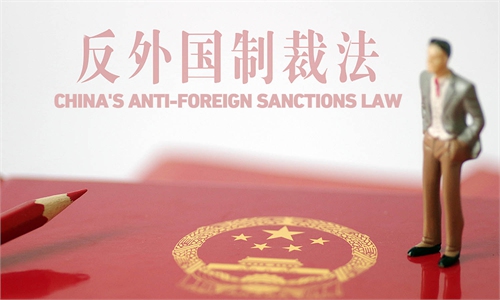COMMENTS / EXPERT ASSESSMENT
Foreign governments bullying China will be met with counter sanctions

Illustration: Tang Tengfei/GT
During the past several years, the world has witnessed a see-saw of sanctions and counter sanctions between the governments of the US and China - a reflection of Washington politicians' reckless determination to create troubles in order to stifle growth of an emerging economic juggernaut, and the intransigence and unbending character of Beijing to uphold justice and not bow to a bully.China's leadership has strong faith in state-to-state equality and mutual respect, and in maintaining a rules-based global order centering the United Nations (UN) but not a single nation or a small clique, say, G7 or Five Eyes. Beijing is resolutely opposed to power politics, economic and technology coercion, and hegemony.
China believes that all differences must be solved through good-willed consultation and dialogue. Any sanctions imposed on China and Chinese people will be met with like-for-like counter sanctions. China's resolve is embodied in the 2018-19 trade war, and it will be expanded to all fields concerning China's sovereignty and national interests.
It was the previous US administration of Donald Trump that fired the first salvo of punitive tariffs in early 2018 against Chinese and other countries' goods being imported to the US. A few days later Beijing fired back, imposing identical duties on American commodities. The retaliatory move, cutting into Trump's self-righteousness, escalated quickly and cascaded to a widespread and sweeping trade and technology war between the world's two largest economies which has lasted till today.
Despite the phase-1 trade agreement signed between the two nations on January 15, 2020, the magnitude and depth of the trade tussle is unprecedented in human history, impairing economic growth of both and the world as a whole, while causing severe disruption of global supply chains such as a serious drought of the world's semiconductor microchips supply.
Increasingly, higher tariffs have led to across-the-board price hikes in the US market and elevating inflationary pressure there. In May this year, the consumer price index, a major gauge of inflation, rose to 5.0 percent, the highest level in 13 years. The same index for China is registered at merely 1.3 percent. If the current Biden administration continues to stick with Trump's tariffs, US inflation is poised to grow ever higher, eating into the livelihood of the majority of American households and forcing the US central bank to raise interest rates.
To counter US and other Western nations' discriminatory and unilateral sanctions against China, relating to China's Xinjiang, Hong Kong and Taiwan, last week, the Standing Committee of the National People's Congress (NPC), the country's top legislature, approved the Anti-foreign Sanctions Law - providing a legal framework for the central government, Chinese companies and individuals to push back and seek compensation against foreign sanctions.
The Law stipulates that foreign organizations, companies and individuals involved in the making or implementation of discriminatory measures or interfering with China's internal affairs would be put onto a blacklist. Those blacklisted individuals can also find their families, and the organizations of which they are senior executives or have control over, placed on the list too. The blacklisted and their offspring could be denied entry into China, and their bank assets in the country seized or frozen.
Companies within China could be restricted from engaging in all forms of transactions or cooperation or other activities, potentially limiting the investment activities of blacklisted entities in China.
A Chinese saying goes like: "Offend no one if none offends you, but retaliate decisively if you are attacked." The new legislation by the NPC is truly a long overdue "legal weapon" which is urgently needed to counter and possibly deter US and other Western nations' aggressive sanctions targeting Chinese entities and nationals.
After the NPC's approval of the National Security Law for Hong Kong Special Administration Region, the Trump administration last year announced arbitrary sanctions on all the vice-chairs of the NPC Standing Committee and a group of senior officials in Hong Kong, undermining international relations norms.
On January 20 this year, minutes after the Trump administration formally ended their period in office, Beijing imposed sanctions on 28 high-ranking Trump's lieutenants, including departing secretary of state Mike Pompeo, trade advisor Peter Navarro, national security adviser Robert O'Brien, health secretary Alex Azar, UN ambassador Kelly Craft and former top Trump aide Steve Bannon. The 28 ex-officials and immediate family members will be banned from entering China, and companies and institutions associated with them will be restricted from doing business with China. Many Chinese netizens hope those Westerners hostile to China should be permanently banned from this country.
A statement issued by China's Foreign Ministry read that Pompeo and the others had "planned, promoted and executed a series of crazy moves, gravely interfered in China's internal affairs, undermined China's interests, offended the Chinese people, and seriously disrupted China-US relations."
Carrie Lam, chief executive of HKSAR who has been sanctioned by Washington together with other senior SAR officials, hailed the new legislation by the NPC, saying the law will provide legal grounds for China to strike back. "Let others have a taste of their own medicine," Lam articulated.
Of course, the new law is defensive in nature, which will only be used when other governments apply sanctions on China first. But China's measures will have sharp teeth. Backed with a booming economy, a market of 1.4 billion increasingly affluent consumers as well as constantly rising international prestige, China's counter sanctions are set to weigh on Western "powers."
The author is an editor with the Global Times. bizopinion@globaltimes.com.cn


